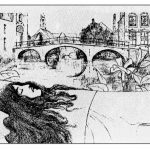
Sophocles’ play Antigone tells the story of a young woman who defies the laws of the state in order to do what she believes is right. The issues considered in the play remain as important now as they were almost two and a half millennia ago. Should one follow one’s conscience or obey the law? Does justice transcend the law? How does one determine what is right?
In the words of Hegel, Antigone is
one of the most sublime and in every respect most excellent works of art of all time. Everything in this tragedy is logical; the public law of the state is set in conflict over against inner family love and duty to a brother; the woman, Antigone, has the family interest as her ‘pathos’, Creon, the man, has the welfare of the community as his. (Hegel, 1975, p 464).
The word pathos most commonly means the quality of something that evokes pity. However, Hegel uses the word to denote “an inherently justified power over the heart, an essential content of rationality and freedom of will” (p 232). Pathos is the emotional commitment that defines a person – his or her driving passion. Sophocles’ play presents the conflict of these passions.



